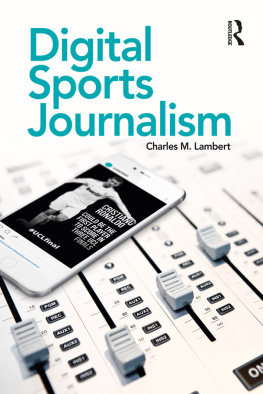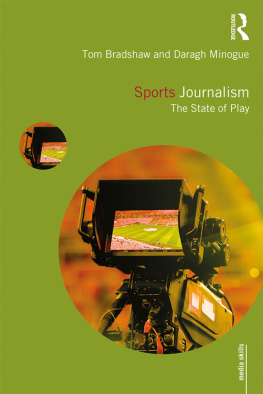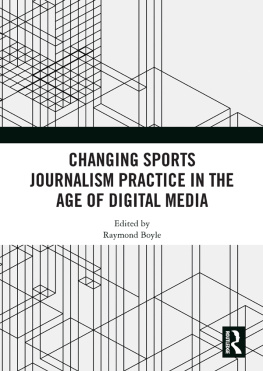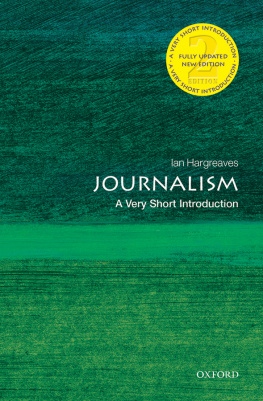
TRAVEL JOURNALISM
In the last decade, with the success of review sites and online commentaries, and with the increased accessibility of travel information online, the job of a traditional travel journalist is being challenged. Travel Journalism closely examines the impact of digital media and technology on this specialist area of journalism and how professionals working in travel media today are adapting to it.
Bryan Pirolli draws on a wealth of professional experience to present both practical guidance and a theoretical analysis of travel journalism. Through interviews with content providers including journalists and bloggers the book explores new ways of thinking about this profession. Looking at the relationship between travel journalists, social media and influencers, the book asks how travel journalists might rethink their work for more constructive purposes and how they should respond to innovations like the ever-growing sharing economy. The book also explores how journalistic ethics can be preserved as concerns around sponsored content and paid influencers remain widespread.
For students and professionals looking to better understand the role of the travel journalist in the digital age, this book is an invaluable resource. Pirolli comprehensively assesses the challenges and opportunities for success that actors in travel media are now presented with and encourages readers to proactively embrace them.
Bryan Pirolli holds a communications PhD and is a researcher with the Sorbonne Nouvelle Institut de la Communication et des Mdias, France. He lectured at London College of Communication and Birkbeck College while studying travel media. He has worked as a journalist for publications including CNN Travel and Time Out Paris.
TRAVEL JOURNALISM
Informing Tourists in the Digital Age
Bryan Pirolli
First published 2019
by Routledge
2 Park Square, Milton Park, Abingdon, Oxon OX14 4RN
and by Routledge
711 Third Avenue, New York, NY 10017
Routledge is an imprint of the Taylor & Francis Group, an informa business
2019 Bryan Pirolli
The right of Bryan Pirolli to be identified as author of this work has been asserted by him in accordance with sections 77 and 78 of the Copyright, Designs and Patents Act 1988.
All rights reserved. No part of this book may be reprinted or reproduced or utilized in any form or by any electronic, mechanical, or other means, now known or hereafter invented, including photocopying and recording, or in any information storage or retrieval system, without permission in writing from the publishers.
Trademark notice: Product or corporate names may be trademarks or registered trademarks, and are used only for identification and explanation without intent to infringe.
British Library Cataloguing-in-Publication Data
A catalogue record for this book is available from the British Library
Library of Congress Cataloging-in-Publication Data
A catalog record has been requested for this book
ISBN: 978-1-138-08696-8 (hbk)
ISBN: 978-1-138-08697-5 (pbk)
ISBN: 978-1-315-11073-8 (ebk)
To Heather for sending me down this road
Id like to thank the Sorbonne Nouvelle for its support during my studies, in particular Professor Franck Rebillard. Thanks to the Journalism Department at London College of Communication for sending me around the world to share my research. Special thanks to the individuals in Paris and beyond who gave their time to me during this process.
When I moved to Paris from Philadelphia in 2008, I had never read a TripAdvisor review. I had never Googled a blog about Parisian life. I was only vaguely familiar with YouTube, launched just three years earlier. Instead, I came armed with a recent edition of the Lonely Planet guide, gifted to me by my former boss, and a university diploma fresh from the press. I worked at an American study abroad campus by day not far from the Eiffel Tower, but on the nights and weekends I wrote stories about trips in Paris, itineraries, places to visit, and general news for a platform called Associated Content. It was a service, since acquired by Yahoo, that allowed me to upload my stories and earn a few meager dollars from the comfort of my apartment. The more views I got, the better the pay, and there was always the possibility that a publication would purchase my story from the site. I was, as far as I was concerned, becoming a travel journalist.
I wrote about a recent trip to Philadelphia just prior to my departure. I penned a piece about Air India cancelling their low-cost route between Paris and Newark. These articles went up on the website, seen by a few dozen eyeballs before disappearing into the abyss of the internet. I may have earned about twenty US dollars for all my efforts, but I was determined. I wanted to keep writing. I hoped to move beyond user-generated content, to become a real travel journalist which meant working for one of the big brands like Cond Nast Traveler, where I had interned as a university student in New York. I scoured job sites, sending out rsums left and right. It wasnt until I began my masters nearly two years later that I got my break interning for an American travel journalist in Paris. All of a sudden, I was working on the Fodors travel guide. Through this journalist I met other writers who knew other editors, and my network grew. By the time I left Paris in 2016, I had worked for travel guides and websites around the world and could more confidently call myself a travel journalist, seguing into London where I continued to work with other brands on travel-related projects.
Looking back on the last ten years, I believe that the route I took may look unfamiliar to many aspiring travel writers. With Instagram influencers, blogs on every major publications website, and easier access to creating quality podcasts, Im not sure that I could have relied on following the same path I did a decade earlier. At the time though, it made sense to me then. Raised on daily papers, stories above the fold, Readers Digest, and Time magazine, print was all I knew. My journalism education at university was not yet designed to tackle questions of user-generated content or online publishing, and teachers praised me for landing stories in print, like my first story in the New York Post when I was a senior. In school, however, we never mentioned travel journalism, at least not as a viable career option. The only travel writing class I could find focused on works by Gustave Flaubert and Jamaica Kincaid, sequestered in narratives and not journalism. Venturing out on my own, however, I learned very quickly that digital publications were where I should be looking. The big papers were still there, still accepting pitches, but there was a whole online frontier that was only just being colonized.
Ten years later, travel journalism is still evolving. Like most evolutionary shifts, however, these changes do not happen in isolation. Both the tourism industry and the journalistic profession are responsible for the news practices and expectations facing travel journalists today. It is increasingly difficult to discuss this niche form of media without understanding the forces at work behind it, shaping it, and adapting it to a digital environment where its practitioners and audiences mingle concurrently. This book is a look at this environment and these players, to help journalism students understand how travel journalism faces a unique collection of challenges in a digital age, and how they can respond in a professional arena.







